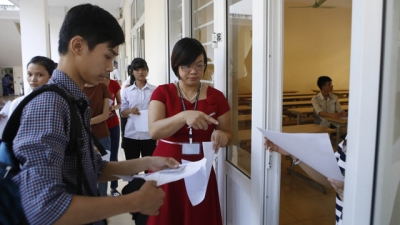
The 2015 national high school exams kicked off on the morning of July 1 with nearly 1 million students across the country sitting for the first subject: math.
The 2015 national high school exams kicked off on the morning of July 1 with nearly 1 million students across the country sitting for the first subject: math.
Examinees must sit a 180 minute test for math in the morning and a 90 minute foreign language test in the afternoon.
 |
| Candidates finalise necessary procedures prior to the exam at Hanoi-based National Economics University’s Exam Council on June 30. |
Exam questions were developed in order to ensure appropriate synchronisation with the actual teaching and learning at high schools and towards capacity assessing learner’s abilities. Examination questions are divided into two parts: basic knowledge questions and advanced questions to classify the exam results of candidates and support universities and colleges in the admission of pupils.
According to statistics of the Ministry of Education and Training, a day earlier, 957,529 candidates carried out necessary procedures prior to the exam, reaching 95% of the total 1,006,479 registered candidates for the contest. Of the total, over 280,000 students registered to use the exam’s results for high school graduation only, more than 590,000 candidates registered for high school graduation as well as university and college enrollment, and over 130,000 students who had graduated from previous years registered for admission at a university or college.
This year there are 1,1671 exam venues with 34,840 rooms across the nation.
The exam receives wide support from the whole community nationwide.
The National Traffic Safety Committee has issued several documents on enhancing traffic safety during the exam, forbidding truck circulation in exam areas from now until the end of the exam. Local health agencies required eateries to implement strict commitments to ensure food safety. Stores, hotels, and motel service are required to not increase prices during the exam. The electricity sector has also been requested to ensure adequate supply of electricity to examination locations and dispatch technicians at exam venues to handle any incidents.
Furthermore, many local enterprises, social organisations, and individuals have raised money to support candidates during the exam period, especially those in ethnic minorities and disadvantaged students. They have engaged in providing travel services, free meals and free lodging for students and their families. Youth volunteers from universities and colleges have joined activities to support students and their families during the four day exam.
Students will take literature and physics examinations on the second day of the exam, geography and chemistry on the third day and history and biology on the last day on July 4.
(Source:Nhan Dan)





